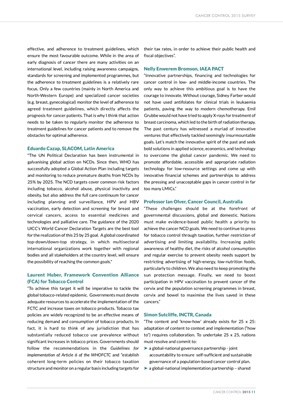
effective, and adherence to treatment guidelines, which
ensure the most favourable outcome. While in the area of
early diagnosis of cancer there are many activities on an
international level, including raising awareness campaigns,
standards for screening and implemented programmes, but
the adherence to treatment guidelines is a relatively rare
focus. Only a few countries (mainly in North America and
North-Western Europe) and specialized cancer societies
(e.g. breast, gynecological) monitor the level of adherence to
agreed treatment guidelines, which directly affects the
prognosis for cancer patients. That is why I think that action
needs to be taken to regularly monitor the adherence to
treatment guidelines for cancer patients and to remove the
obstacles for optimal adherence.
Eduardo Cazap, SLACOM, Latin America
"The UN Political Declaration has been instrumental in
galvanising global action on NCDs. Since then, WHO has
successfully adopted a Global Action Plan including targets
and monitoring to reduce premature deaths from NCDs by
25% by 2025. The NCD targets cover common risk factors
including tobacco, alcohol abuse, physical inactivity and
obesity, but also address the full care continuum for cancer
including planning and surveillance, HPV and HBV
vaccination, early detection and screening for breast and
cervical cancers, access to essential medicines and
technologies and palliative care. The guidance of the 2020
UICC's World Cancer Declaration Targets are the best tool
for the realization of this 25 by 25 goal. A global coordinated
top-down/down-top strategy, in which multisectoral
international organizations work together with regional
bodies and all stakeholders at the country level, will ensure
the possibility of reaching the common goals."
Laurent Huber, Framework Convention Alliance
(FCA) for Tobacco Control
"To achieve this target it will be imperative to tackle the
global tobacco-related epidemic. Governments must devote
adequate resources to accelerate the implementation of the
FCTC and increase taxes on tobacco products. Tobacco tax
policies are widely recognized to be an effective means of
reducing demand and consumption of tobacco products. In
fact, it is hard to think of any jurisdiction that has
substantially reduced tobacco use prevalence without
significant increases in tobacco prices. Governments should
follow the recommendations in the Guidelines for
implementation of Article 6 of the WHOFCTC and "establish
coherent long-term policies on their tobacco taxation
structure and monitor on a regular basis including targets for
their tax rates, in order to achieve their public health and
fiscal objectives".
Nelly Enwerem Bromson, IAEA PACT
"Innovative partnerships, financing and technologies for
cancer control in low- and middle-income countries. The
only way to achieve this ambitious goal is to have the
courage to innovate. Without courage, Sidney Farber would
not have used antifolates for clinical trials in leukaemia
patients, paving the way to modern chemotherapy. Emil
Grubbe would not have tried to apply X-rays for treatment of
breast carcinoma, which led to the birth of radiation therapy.
The past century has witnessed a myriad of innovative
ventures that effectively tackled seemingly insurmountable
goals. Let's match the innovative spirit of the past and seek
bold solutions in applied science, economics, and technology
to overcome the global cancer pandemic. We need to
promote affordable, accessible and appropriate radiation
technology for low-resource settings and come up with
innovative financial schemes and partnerships to address
the pressing and unacceptable gaps in cancer control in far
too many LMICs."
Professor Ian Olver, Cancer Council, Australia
"These challenges should be at the forefront of
governmental discussions, global and domestic. Nations
must make evidence-based public health a priority to
achieve the cancer NCD goals. We need to continue to press
for tobacco control through taxation, further restriction of
advertising and limiting availability. Increasing public
awareness of healthy diet, the risks of alcohol consumption
and regular exercise to prevent obesity needs support by
restricting advertising of high-energy, low-nutrition foods,
particularly to children. We also need to keep promoting the
sun protection message. Finally, we need to boost
participation in HPV vaccination to prevent cancer of the
cervix and the population screening programmes in breast,
cervix and bowel to maximise the lives saved in these
cancers."
Simon Sutcliffe, INCTR, Canada
"The content and 'know-how' already exists for 25 x 25:
adaptation of content to context and implementation ("how
to") requires collaboration. To undertake 25 x 25, nations
must resolve and commit to:
‰ a global-national governance partnership - joint
accountability to ensure self-sufficient and sustainable
governance of a population-based cancer control plan.
‰ a global-national implementation partnership - shared
CANCER CONTROL 2015 SURVEY
CANCER CONTROL 2015 11